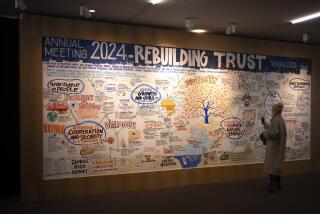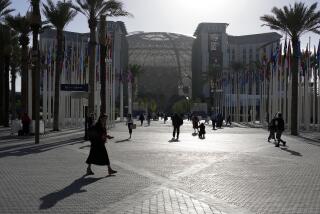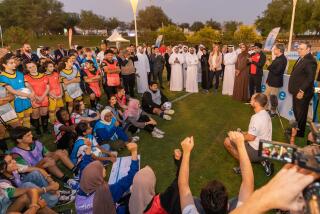Diplomats, Others Meet Far from the Madding Crowd : Quiet Talks in Rustic Settings Help Solve World’s Ills
- Share via
WILTON PARK, England — The Russian, an economic adviser to Soviet leader Mikhail S. Gorbachev, strode across the lawn of the 16th-Century manor house, carefully eyed the croquet ball and, with a final confident stroke, polished off his opponent, a British diplomat.
Croquet may seem a curiously trivial endeavor for such senior policy-makers, but to the scholars and news media representatives gathered here--50 miles south of London--for a weeklong seminar on developments in the Soviet Union, it had its serious side.
People involved in shaping and monitoring major political developments have come to view the informal contacts offered in such sessions at Wilton Park and other international conference centers as valuable opportunities to discuss delicate, complex issues in a relaxed, comfortable setting. The limited number of participants, usually between 25 and 30, adds to the sense of informality.
Representatives of the news media who are invited to take part in these sessions are usually restricted by ground rules of confidentiality, and as a result the encounters take place largely outside public view. Yet their impact, although impossible to measure precisely, is perceived as being an increasingly important element in the diplomatic process.
“It’s an extremely valuable way to exchange views,” said Ruediger von Wechmar, a former West German representative to the United Nations who is now his government’s ambassador in London. “The formulation of government policy often starts in sessions of this kind.”
As an example, Von Wechmar pointed out that the idea of early alert centers, which are central to a U.S.-Soviet accord on reducing the threat of accidental war that was signed recently in Washington, first came up at an Aspen Institute seminar attended by officials of several Western governments as well as prominent elder statesmen, among them former U.S. Secretary of State Cyrus R. Vance and former West German Chancellor Helmut Schmidt.
The idea was presented directly to senior officials of the Reagan Administration, then discussed at the Reagan-Gorbachev summit in Geneva in November, 1985, and eventually agreed to by the U.S. and Soviet governments.
The growing popularity of high-level conference centers like the Aspen Institute and the one here at Wilton Park reflects the heightened value of unhurried, informal exchanges at a time when senior policy-makers and analysts find themselves under increased pressure.
“Interest has grown steadily,” said Reginald Hibbert, who until his retirement last July served for five years as director of another conference center, at Ditchley Park, a manor near Oxford. “Once you establish a reputation for getting good people, everyone wants to come.”
The best known of the centers specialized at first in relatively narrow fields, but these have broadened as the world has become increasingly interdependent.
For example, Wilton Park, which began as a re-education center for German prisoners of war, concentrated its first post-World War II efforts on Anglo-German relations but has gradually expanded its interests to include East-West and Third World issues.
Ditchley Park, in its 12 or 14 conferences a year, has traditionally accented Anglo-American relations, although French and German dimensions have been added in recent years. The Rockefeller Foundations’s Bellagio Study and Conference Center, on Lake Como at the foot of the Italian Alps, concentrates on a variety of issues, including the arts, humanities and global development.
At most of the seminars, discussions rather than written presentations dominate the formal sessions, and long periods are left free for informal contacts.
Wartime Headquarters
At Ditchley Park’s ornate 18th-Century mansion, which Winston Churchill used as a wartime headquarters, Saturday afternoons are left unstructured even though many of the participants have traveled thousands of miles for the 48-hour sessions.
Geoffrey Denton, director of Wilton Park, noted that in the 20 conferences that usually take place here every year, long periods of free time are blocked out in an effort to promote informal contact.
The results of such a policy are difficult to assess, but the opportunities are valued by participants, in some cases because they constitute a rare chance for candid exchanges out of public view.
Denton recalled that in the course of a May, 1986, seminar on Mediterranean security, a Turkish Cypriot political leader and his Greek Cypriot counterpart restored a working relationship that had been interrupted 12 years earlier during the island’s 1974 crisis.
“It was fascinating to watch them reestablish contact,” Denton said.
One of the sparks that led to last spring’s controversial meeting between black and white South Africans in Dakar, the capital of Sengal, is believed to have been ignited two months earlier at a Wilton Park conference where two of the organizers of the Dakar meeting met for the first time.
Early last month, prominent Protestants and Roman Catholics from Northern Ireland mixed with ministers of the Irish and British governments and news media representatives in the detached environs of Cambridge University for a formal and informal exchange of ideas in a way that would not be possible in strife-torn Northern Ireland.
A senior British policy-maker who attended the sessions said: “For most of the year, I read detailed papers and rely on people to advise me on the issue, but this is a teach-in about the realities. More than half the value is what you learn at 5 o’clock in the morning over a glass of Guinness.”
These gatherings, sponsored by the London-based British-Irish Assn., are credited by political leaders from both sides with easing tensions and opening new avenues of communication.
“It’s a chance to listen, learn and meet those individuals you couldn’t otherwise meet,” said former Prime Minister Garrett FitzGerald of Ireland, who was among the participants.
A key to the success of such meetings is their confidential nature. On the rare occasions when confidentiality is violated, difficulties arise quickly.
When a 1986 Wilton Park conference on South Africa was described in advance by press outlets in South Africa and Britain as a secret negotiating session, a number of persons invited to attend failed to appear.
For academicians and area specialists, these opportunities for high-level contacts offer a special form of exposure and contact making, especially across political divides.
The respected Georgetown University demographer Murray Feshbach said that forging relationships with East Bloc counterparts helps open doors for the future that would otherwise be closed.
“If you establish your credibility, then people are willing to see you,” he said. “It’s easier to get past the receptionists.”
Conference participants at Wilton Park--or their employers or governments--typically pay two-thirds of the cost of the seminar, and the British Foreign Office picks up the remainder. Ditchley Park, on the other hand, is funded by its endowment and by private sources--largely corporate and individual donations.
More to Read
Sign up for Essential California
The most important California stories and recommendations in your inbox every morning.
You may occasionally receive promotional content from the Los Angeles Times.










